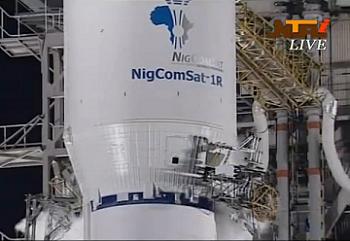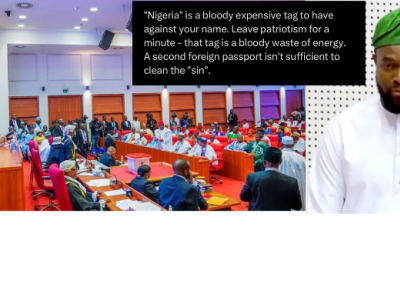Matters eRising with Olusegun Oruame
Some weeks back, the Nigerian government gleefully announced that both China Great Wall Industry Corporation(CGWIC) and Export-Import (EXIM) Bank of China will be committing about $550m to produce and launch two new communication satellites (comsat) for the Nigerian Communications Satellite (NigComSat) Limited, the government owned comsat company established over a decade ago.
The two new satellites, expected to be in orbit by 2020, will join NigComSat-1R, also built by the Chinese (almost 11 years ago) to replace its predecessor that was de-orbited only months after it was initially launched into space because the solar panel with battery had failed. NigComSat-1R is a replacement satellite for NigComSat-1 (note the R for replacement).
Nigeria has built a robust relationship with China in pursuit of its satellite mission. What may be troubling is that it does not appear Nigeria has made a successful run of its satellite forage for a mix of factors that are both domestic and global.
“A repeat of Sri Lanka in Nigeria’s satellite space is inevitably a possibility that we must come to terms with. Of our own making, we have not built our satellite industry with the patriotic zeal and commitments it demands.”
For the domestic, NigComSat has not enjoyed its entitled patronage from its chief promoter: the Nigerian government even while the publicly owned satcom company fights for market relevance and visibility in the highly tempestuous global satellite industry. I will visit this matter fully in another piece.
But for now, let’s consider the offer of free China loans, a possible buy-into that offers China an equity foothold in Nigeria’s satellite destiny and the frightening scenario of complete ownership of Nigeria’s communication satellite industry by China in which case, the only thing that will become domestic in NigComSat is its Nigerian name.
There’s a precedent to refer to and a warning sign to consider. Last December, China formally took over the strategic port of Hambantota in Sri Lanka via a Chinese state-owned enterprise. Originally, the port was built through China’s fund and technical skill.
The Hambantota port was not designed to be owned or managed by the Chinese. But the Chinese-financed and built port had become immersed in huge debt which the Sri Lankan government could not repay. The result is a new deal that offered China a 99-year lease to take full control of the port raising fears of re-colonialism 70 years after the Sri Lankans took off that British yoke.
China’s minty tea for Sri Lanka is understandably, raising fears in India. The Indians are deeply worried that China’s complete acquisition of the Hambantota’s port is a further consolidation of “Beijing’s growing strategic and economic footprint in the Indian Ocean region,” as one writer puts it. For the Indians, Sri Lanka has become the ultimate strategic beacon of China’s Belt and Road Initiative as the unchallenged economic and military power in the Indian Ocean region – a significant pointer to Beijing’s global aspiration as the next world super power.
“Failing to build the required competency to engage the global satellite industry on our terms has a price. We ultimately have to concede our space to be managed by more focused hands.”
What has happened in Sri Lanka is a foretaste of what China would ultimately, and legally demand of those to whom it had committed free money and technical skill. In the last few decades, China (through its state-owned agencies) has committed billions in helping several African countries to rework their economies – building railways, roads, airports, massive urban and telecom infrastructures with extremely irresistible low-entry loan conditions in comparison with the arduous conditions of the west and its Breton Wood institutions.
China has become the go-to place for less hostile loans or grants. The mark of China is all over Africa as Beijing thickens its presence on the continent particularly in countries like Nigeria and Ethiopia to underscore Beijing’s agenda for the continent’s largest economies.
It was to China that Nigeria turned in 2007 to launch its first communication satellite in space. China provided a huge chunk of the fund and the technology to not only launch Nigcomsat-1 but also to launch a new level of Beijing’s deepening interest in Nigeria’s fledgling communication satellite industry; an industry it helped to foster despite subtle opposition from the west. Upon that launch, Beijing has built an increasingly robust relationship with African nations underscoring China’s strategic agenda in Africa for the nourishment of its steadily growing economic, political and military interests.
Africa is both a market for China’s finished goods and the receiving points for Chinese skilled labour just as it has always been the mining grounds for raw materials. There is little the continent has done to improve its conditions beyond being just a mining space for export of crude minerals leaving off only a token for the continent of over one billion people to subsist on.
“It is our duty to build sufficiency and competence in NigComSat. To encourage a ‘feeding-bottle ‘approach to advancing NigComSat as the manager of Nigeria’s satellite destiny is to foster dependency and despondency on an entity that ordinarily should be a pointer to our national advancement in the technological spheres.”
Why should we be suspicious of China’s $550m to produce and launch the two new communication satellites for Nigeria? The reason is not farfetched. A repeat of Sri Lanka in Nigeria’s satellite space is inevitably a possibility that we must come to terms with. Of our own making, we have not built our satellite industry with the patriotic zeal and commitments it demands. Since the Chinese helped build Nigcomsat-1 and then Nigcomsat-1R, we have struggled to engage the global satellite markets and failed to statutorily mandate the domestic market to patronize Nigcomsat-1R, thus, we have remained at the fringe of the global satellite industry with beggarly status.
Beggars must ultimately kowtow to the whims of their patrons. You doubt this? Ask the Sri Lakans!
In the original funding scheme for the two satellites, Nigeria was required to provide 15 per cent counterpart funding. But according to the Nigeria’s Minister of Communications, Adebayo Shittu; “Because we could not afford this 15 per cent, we have renegotiated with the China EXIM Bank and the China Great Walls, who are the manufacturers, and they have happily agreed to pay the entire $550m to procure two new satellites.”
The $550m investment gives CGWIC and China EXIM Bank equity stakes in NigComSat which the Nigerian minister did not disclose. Are you seeing the red flags? Why is the Nigerian government denying the public, information on the equity stake set aside for the Chinese firms? What are the terms of the agreement? Are there possible clauses that may make China the sole or major stakeholder? Why is the deal shrouded in mystery at this stage?
“Since the Chinese helped build Nigcomsat-1 and then Nigcomsat-1R, we have struggled to engage the global satellite markets and failed to statutorily mandate the domestic market to patronize Nigcomsat-1R, thus, we have remained at the fringe of the global satellite industry with beggarly status.”
China money is good. Chinese support is both helpful and desirable. But Nigeria must be wary of China’s Sri Lankan tea. It is our duty to build sufficiency and competence in NigComSat. To encourage a ‘feeding-bottle ‘approach to advancing NigComSat as the manager of Nigeria’s satellite destiny is to foster dependency and despondency on an entity that ordinarily should be a pointer to our national advancement in the technological spheres.
Failing to build the required competency to engage the global satellite industry on our terms has a price. We ultimately have to concede our space to be managed by more focused hands. Ask the Sri Lankans, they would be sitting at the shores in Colombo for the next 99 years while China redefines all of Asia’s politics and economy from the Hambantota port.































